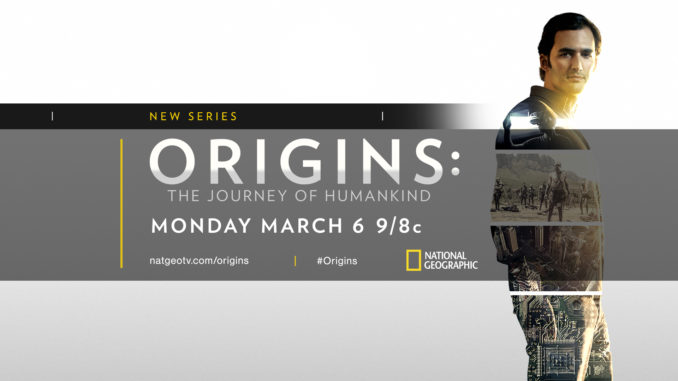
Read the full post at Forbes: Nat Geo ‘Origins’ Examines Pivotal Moments In Human Development.Mankind has evolved—both as a species and as a society—over hundreds of thousands of years. We can trace that evolution anatomically and biologically through the web of natural selection over time, but there are also key events throughout history that have had a direct impact on how humans have developed and grown. A new Nat Geo series, Origins, dives into those pivotal moments to look at how specific discoveries or events have shaped us.
Origins takes a similar approach to other recent and upcoming Nat Geo series like Mars, and Genius. It combines real-world facts and history with narrative-style stories and reenactments. It worked very well for Mars, and it seems that Nat Geo is focused on producing innovative content that reflects this approach.
Origins is subtitled “The Journey of Humankind.” It strives to trace the pivotal innovations that made us modern. Jason Silva acts as host and guide for the series—a role sort of like Carl Sagan on Cosmos. Silva introduces the subject at the beginning of each episode to set up the topic and frame what viewers are about to see.
The premise of Origins is to look at focal points in human history—the events and discoveries that have shaped the evolution and development of mankind. Things like fire, healthcare, money, writing, and more are each examined to take a closer look at how they fundamentally altered the path of humanity moving forward.
I had an opportunity to speak with Silva. The 35-year old Venezuelan American has established himself as a thoughtful and credible resource on the topics of science and technology. He has lectured internationally on topics ranging from creativity and spirituality to technology and humanity, and he brings a wealth of knowledge, and—more importantly—curiosity to the table to explore the topics in Origins.
I enjoyed speaking with Silva. We probably could have talked for hours. Even in our short, 15-minute conversation that was ostensibly about Origins we managed to diverge wildly into a number of areas that I find fascinating.




Had high hopes for this series. Quickly dashed. Between Mr. Silva’s over accentuated and repetitive gesticulations, and the unnatural emphasis in his speech, I was totally distracted and could barely stand to stay tuned until another video segment began. Well that didn’t really help. From the pathetically and poorly focused vignettes, that really conveyed very little interesting information, I was constantly asking myself “yeah, but what about…?” as he skipped obvious mountains of interesting detail only to founder in protracted micro-dramas over things like the sinking of a slave ship? Add to it some seriously flawed premises and I literally couldn’t stand to watch a second episode (having begun with Currency). So many potentially interesting and informative salients ignored. All hat and no cattle IMNSHO. Guess it was my fault for expecting more. I honestly would have learned more from an eighth grade World Cultures class filmstrip. Who funds this stuff? Nice graphics dude, needs more aliens.